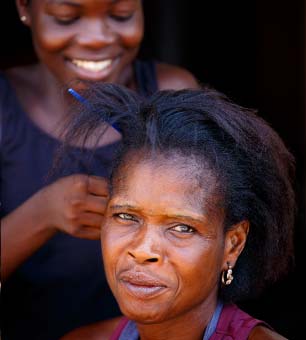Part of the Series
Solutions
Honest, paywall-free news is rare. Please support our boldly independent journalism with a donation of any size.
 (Image: Young woman make hairdressing for older woman via Shutterstock)When Farah Tanis began to meet with a group of low-income women to discuss their economic challenges, she found that nine out of ten were survivors of domestic violence or sexual assault.
(Image: Young woman make hairdressing for older woman via Shutterstock)When Farah Tanis began to meet with a group of low-income women to discuss their economic challenges, she found that nine out of ten were survivors of domestic violence or sexual assault.
“Most of us had grown up in poverty and we started looking at what were the systemic causes of poverty for us,” she said. “We started looking at economic security as a human right and an extension of the Civil Rights.”
Out of those conversations came the Black Women’s Blueprint, a group that now anchors a bartering network, a sou-sou (savings pool), and several other cooperative projects.
“Through our barter network we were able to barter food for the week, for a car ride for the week, and that’s what sustained many of us.
“It prevented homelessness, starvation and kids being left at home alone by themselves. The barter network builds community and it builds trust,” explained Tanis at a panel discussion co-sponsored by GRITtv.
From the Underground Railroad to the Civil Rights movement and beyond, cooperative strategies developed by African American women have played a leading role in helping communities survive hard times, said author, economist Jessica Gordon Nembhard, author of Collective Courage, a History of African American Cooperative Economic Thought and Practice.
“Like most women, black women have always been in the background,” Gordon Nembhard said. “Often the leaders and the spokespeople were men but the people doing all of the work and the strategizing were women.”
A terrifying moment. We appeal for your support.
In the last weeks, we have witnessed an authoritarian assault on communities in Minnesota and across the nation.
The need for truthful, grassroots reporting is urgent at this cataclysmic historical moment. Yet, Trump-aligned billionaires and other allies have taken over many legacy media outlets — the culmination of a decades-long campaign to place control of the narrative into the hands of the political right.
We refuse to let Trump’s blatant propaganda machine go unchecked. Untethered to corporate ownership or advertisers, Truthout remains fearless in our reporting and our determination to use journalism as a tool for justice.
But we need your help just to fund our basic expenses. Over 80 percent of Truthout’s funding comes from small individual donations from our community of readers, and over a third of our total budget is supported by recurring monthly donors.
Truthout’s fundraiser ends tonight! We have a goal to add 143 new monthly donors before midnight. Whether you can make a small monthly donation or a larger one-time gift, Truthout only works with your support.